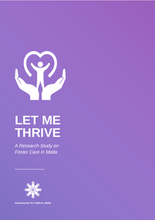This is an article discussing a research study performed to determine the best forms of out of home care for children. In particular, the study aimed to obtain in-depth knowledge of the factors that contribute to meet the holistic needs of the fostered child and factors that may contribute to foster care placement breakdown in Malta. The results found that foster care was the form of out of home care that worked in the best interest of the child.
The theorhetical framework of this study is formed by children's rights and the UNCRC. The Center for Children's Rights at Queen's University buids the children's rights based approach to research upon which this study is based. The study goes in-depth as to what lengths this research aligns with the highest standards of children's rights based research.
The first phase of the study consisted of mapping the field, which created rough boundaries. These boundaries were used as a guide to delimit the research. The main data collection used was in-depth anonymouse interviews. The interviews were in the form of casual conversations that lasted one to three hours. The study included participant observation. This study also includes detailed case studies.
Participants who lived with the foster carers felt a "reassuring sense of belonging in their foster family."

